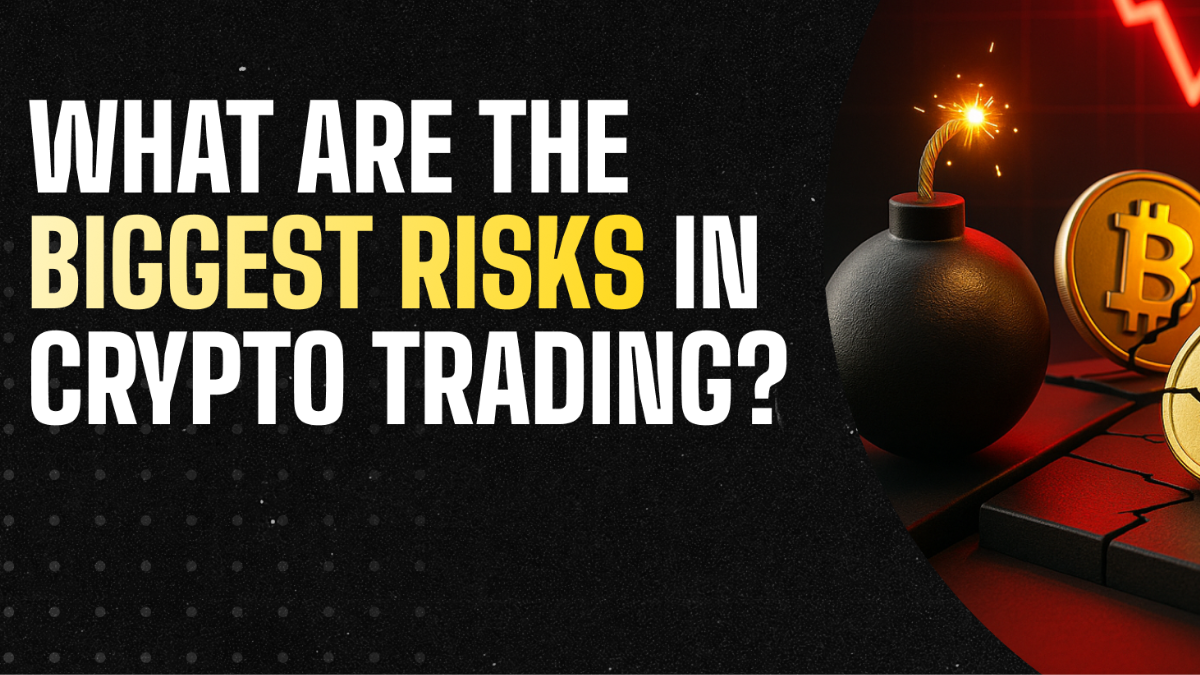Bitcoin trading has grown into one of the most talked-about financial activities of the decade, drawing the attention of new investors, experienced traders, institutions, and global markets. With its high volatility, potential for rapid profits, and increasing mainstream acceptance, Bitcoin remains an exciting yet unpredictable asset. While many traders experience impressive gains, others face significant losses due to the inherent risks of cryptocurrency trading.
Understanding the risks involved in Bitcoin trading is essential for anyone entering this fast-moving market. Bitcoin offers tremendous opportunities, but only when traders understand its challenges, limitations, and potential pitfalls. Whether you are a beginner exploring the market for the first time or an experienced trader aiming for consistent results, knowing the risks can help you make smarter, safer, and more strategic trading decisions.
This in-depth guide explores the major risks associated with Bitcoin trading, how they affect profitability, and how traders can better prepare themselves before diving into the crypto market.
Understanding Bitcoin as a Trading Asset
Bitcoin is unlike any traditional asset. It does not behave like stocks, commodities, bonds, or currencies. Instead, it combines elements of all these markets while adding decentralized technology and unique blockchain mechanics. Its price reacts to supply-and-demand dynamics but also responds to speculation, investor sentiment, global policies, and even technological updates.
Bitcoin is limited in supply, making it resilient to inflation. However, this scarcity also amplifies price reactions when there is high demand or major economic events. In 2025 and beyond, Bitcoin continues to attract institutional interest, but that does not eliminate the risk factors. In fact, as the market grows, new risks emerge, making understanding them essential.
Key Risks Involved in Bitcoin Trading
Bitcoin trading involves several core risks that every trader must understand before entering the market. These risks are not designed to scare you away but to prepare you for real-world scenarios that have affected millions of traders.
Market Volatility Risk
Bitcoin is known for its extreme volatility. Its price can rise sharply within minutes and fall just as dramatically. This volatility creates opportunities but also exposes traders to sudden losses. Traders who lack a strong risk-management plan may panic, sell at the wrong time, or hold losing positions for too long.
Volatility is driven by many factors, including economic news, market sentiment, institutional activity, and global events. While volatility can be profitable for experienced traders, beginners often struggle to manage the rapid fluctuations. Understanding how to navigate volatile markets is essential for long-term trading success.
Liquidity Risk
Bitcoin generally has high liquidity, especially on major exchanges. However, not all trading platforms or trading pairs offer deep liquidity. Low liquidity can cause slippage, where a trade executes at a worse price than intended. This is especially common in large orders, off-peak trading hours, or smaller exchanges.
Liquidity risk can reduce profits, increase losses, and make it hard to exit positions quickly. Experienced traders mitigate liquidity risk by choosing reputable exchanges and avoiding thinly traded markets.
Regulatory Risk
Bitcoin operates within a changing and often unpredictable regulatory landscape. Governments around the world continue to develop laws that affect cryptocurrency trading, taxation, privacy, and exchange operations. Sudden regulatory announcements can cause Bitcoin’s price to fluctuate dramatically.
A new tax rule, trading restriction, or policy change can directly impact your trading experience. Traders must stay informed about global regulations to avoid unexpected legal challenges or financial losses.
Security and Cybersecurity Risk
Bitcoin itself is secure as a blockchain system, but traders face security risks through exchanges, wallets, and personal practices. Hackers frequently target cryptocurrency platforms due to the irreversible nature of transactions. When funds are stolen, they are often lost forever.
Security risks include exchange hacks, phishing scams, malware, fake trading platforms, and compromised private keys. Using secure wallets and following proper safety practices reduces these risks, but the threat remains a major concern for all Bitcoin traders.
Emotional and Psychological Risk
Emotional decision-making is one of the biggest risks in Bitcoin trading. Fear of missing out, panic selling, revenge trading, and greed often cause traders to abandon their strategies and make impulsive decisions. Bitcoin’s volatility amplifies emotional reactions, making psychological discipline crucial.
Successful traders learn to control emotions, follow strategic plans, and avoid reacting to short-term market noise. Those who cannot manage emotional pressure often face significant losses.
Leverage Risk
Many trading platforms offer leverage, allowing traders to amplify their positions using borrowed funds. While leverage can multiply profits, it also magnifies losses. Even a small unfavorable price movement can liquidate a leveraged position.
Leverage is one of the fastest ways to lose money in Bitcoin trading, especially for beginners. The temptation to chase larger profits often leads to disaster. Understanding leverage and using it cautiously is essential to avoid severe losses.
Market Manipulation Risk
Because Bitcoin operates in a relatively young and lightly regulated market, manipulation still occurs. Large investors or institutions can influence price movements through coordinated buying or selling. Events such as pump-and-dump schemes, fake news, and spoofing trades can distort market conditions.
Traders must be aware of manipulation and avoid making decisions based solely on sudden spikes or drops that lack fundamental explanation.
Technological and System Failure Risk
Trading platforms sometimes experience outages, downtime, or technical glitches, especially during periods of high trading activity. System failures can prevent traders from executing trades, managing orders, or moving funds. Internet issues, network congestion, blockchain delays, and exchange overloads can all harm trading performance.
Being prepared for technical issues, using backup platforms, and implementing stop-loss strategies can reduce the damage caused by such failures.
How Traders Can Minimize These Risks
Bitcoin trading will always involve risks, but informed traders can manage them effectively through preparation, discipline, and knowledge.
Risk Management Strategies
Good risk management can transform a potentially dangerous market into a profitable opportunity. Traders often use stop-loss orders, diversify their portfolios, limit leverage, and follow disciplined risk-to-reward ratios. Setting clear entry and exit points helps avoid emotional decision-making.
Risk management allows traders to survive volatility, protect capital, and trade more confidently.
Technical and Fundamental Analysis
Successful traders combine technical analysis, fundamental analysis, market psychology, and real-time data. Understanding chart patterns, support and resistance levels, on-chain data, news events, and market cycles helps traders make more informed decisions.
Those who rely purely on speculation face higher risks than those who analyze trends and gather real information.
Choosing Reliable Exchanges and Wallets
Trading on secure and reputable exchanges minimizes security and liquidity risks. Reliable platforms offer strong security features, regulated operations, high liquidity, and transparent practices. Storing long-term holdings in secure hardware wallets protects traders from hacks and vulnerabilities.
Avoiding Emotional Trading
Learning emotional control is essential. Traders who manage fear, greed, and stress achieve far better results than those who act impulsively. Patience, discipline, and rational thinking form the foundation of successful trading.
Meditation, journaling, backtesting strategies, and setting realistic expectations can help traders maintain psychological balance.
Staying Updated With Market News
Bitcoin responds to news faster than traditional assets. Traders should follow global events, regulatory updates, technological advancements, and institutional activity. Awareness helps traders anticipate movements and avoid unexpected shocks.
FAQs About the Risks in Bitcoin Trading
Is Bitcoin trading risky?
Yes, Bitcoin trading carries significant risks due to volatility, regulation changes, security vulnerabilities, and emotional challenges. However, these risks can be managed with proper strategy and discipline.
Can I lose all my money trading Bitcoin?
Yes, especially if you trade with leverage, use insecure platforms, or make emotional decisions. Proper risk management helps prevent total loss.
Is Bitcoin safe from hackers?
The Bitcoin network is secure, but exchanges and wallets can be hacked. Traders must use reputable platforms and secure wallets to reduce risk.
How can I avoid emotional trading?
You can avoid emotional trading by following a predetermined strategy, using stop-loss orders, and managing risk. Emotional discipline comes with practice.
Is leverage trading dangerous?
Yes, leverage increases both profit and loss potential. Even small market moves can liquidate leveraged positions.
How do regulations affect Bitcoin trading risk?
Regulatory changes can influence price, exchange operations, and trading conditions. Staying informed helps traders avoid surprises.
Can beginners trade Bitcoin safely?
Beginners can trade safely by learning basic strategies, avoiding leverage, managing risk, and using trusted exchanges.
Conclusion
Bitcoin trading offers incredible opportunities but comes with significant risks that every trader must understand. From volatility and regulatory changes to emotional challenges and cybersecurity threats, the risks involved in Bitcoin trading are real and must be approached with awareness and caution. However, these risks do not mean trading Bitcoin is impossible or unprofitable. With the right knowledge, tools, and discipline, traders can navigate the market safely and successfully.


